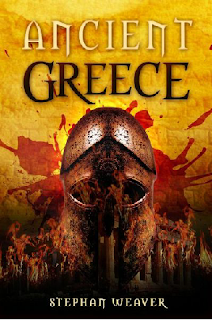This book review was written by Eugene Kernes
“The Archaic Period was the epoch that ushered in the Republics, supplanting the Monarchies. It was also the period that bore the institution of laws (Draco’s reforms in Athens), pottery and sculpture peculiar to Greece and the minting of the first coins. The great Panathenaeic Festival was also instituted. All these laudable developments paved the way for the emergence and the glory of the Classical Period of Greece” – Stephan Weaver, Chapter II, Page 7
“During the Classical period, Greece reached the summit of its glory and took the world by its breath. It was the time in which modern thinking, art, literature, science and philosophy, began to take their first steps; it was when democracy literary took its first breath; the Classical era was the extraordinary period that gave life to the greatest thinkers of our world – Socrates, Plato, Aristotle where but a few.” – Stephan Weaver, Chapter III, Page 14
“The Hellenistic Period of Greece began in 323 BC following Alexander the Great’s death and ended in 31 BC after the invasion of the Roman Republic. The period is characterized by the spread of Greek civilization, thinking, language and more throughout the whole of the eastern Mediterranean region, and Southwest Asia.” – Stephan Weaver, Chapter IV, Page 21
Is This An Overview?
Ancient Greece had gone through various political
changes. Removing the monarchy in favor
of a republic. Developing a
democracy. The earlier cultural
developments set foundations that enabled the later cultural successes. A culture that enabled the rise of various
world renown philosophers that changed how people think. A culture bound to mythical sentiments. Greek culture was acknowledged as valuable by
other states. Alexander the Great
expanded Greek culture, which others further spread during the Hellenistic
Period. The fall of Ancient Greece was
partly due to the Roman Empire, which had undermined Ancient Greece’s
sovereignty. The Greek kingdoms lacked
the unity needed to defend themselves.
Caveats?
A very short book about a long period of time. The book introduces the reader to Ancient
Greece, tempting the reader into searching for more information about Ancient
Greece. The shortness of the book means
that there are a lot of details missing.
The details presented are simplified.
The simplified details can misrepresent events.
